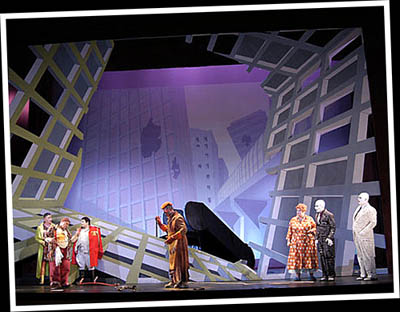Ligeti's Le Grand Macabre :
Contemporary opera makes fun of itself

Judging from the San Francisco Opera offerings thus far into the season, you'd think Pamela Rosenberg had already left town. Yes, there were adequately rendered productions of Tosca, La Traviata, and Billy Budd, all adequately cast, in attractive stagings that were by and large realistic looking and traditional in feel -- cosi fan tutti indeed.
So it was terrifyingly exciting to welcome the U.S. premiere of Hungarian composer Gyorgy Ligeti's Le Grand Macabre at the SF Opera Friday night, and a chance to hear something that is so daringly original both musically and theatrically.
After the company announced that it was pushing back Berlioz' five-hour long epic Les Troyens to 2008, Le Grand Macabre became the season's chief artistic battle horse. Presented in a production imported from the Royal Danish Opera, conducted by Michael Boder and directed by Kasper Holten [see my last post], Friday evening's opening was an impressive achievement for the company, and another vindication of Rosenberg's artistic vision.
It is easy to see why Le Grand Macabre has achieved such a cult stature in Europe. Dubbed the anti-opera, this comedy both mocks and validates the establishment at several levels, in broad yet decisively well-informed strokes. Not even opera itself, as an artform, escapes its sardonic analysis, as the work hilariously ridicules the both excesses of contemporary opera as well as the stifling rigidity of tradition. Through it all, the work's message is ultimately a life affirming one, that somehow through our assorted individual paranoias and deep dysfunctionality, we have the capacity to survive our awkward fears, even if by merely learning to enjoy life and not take it so seriously.
There is nothing lurid or explicit on stage, yet several scenes poke fun at the banality of extreme sexual obsession in contemporary theater that is often seen on European stages -- including an S & M exchange between post menopausal characters, and a pair of lovers constantly looking for a place to do the deed. The mockery is also heightened at the musical level, right from the start with an irreverent car horn sinfonia, the opener of a score that is punctuated by rambunctious odd-ball sounds such as sirens and amplified paper-tearing.
The characters' absurdity is often rendered in amorphous, atonal vocalizations comically stripped of any melodic sense. The Berg-to-Bellini mix offers sudden shifts into outbursts of wild, hilarious stylized displays of belcanto clichés, with endless vocal roulades topped by piercing acuti held to the point where even Donizetti would cry uncle. And those of us who missed Ruth Ann Swenson's high E-flats in La Traviata will not want to miss Gepopo's act 2 bravura showdown, brilliantly rendered by German soprano Caroline Stein in a part worthy of Edita Gruberova.

Of course, for all of this to work one has to assume that the audience is "in" on the joke. At the premiere, it seemed like most of the public in attendance was in synch with Ligeti, judging particularly from the high number of elaborately costumed patrons for the Halloween weekend. Myself, it took a little while to absorb the spirit of the work early in act 1 -- having arrived at the opera house at the last minute, somewhat stressed after a rushed day -- but by the time act 2 started, I was won over and Ligeti had me completely.
Despite the chaotic feel, Le Grand Macabre actually has a thoughtfully conceived architecture. The recurring references to the Dies Irae and Latin texts serves not only as a framing device, but also reminds us that fear and anxiety are atemporal, having been with us from the beginning of time. And as crazy the characters are, each of them are clearly and individually developed early in the opera. By the time we arrive at the apocalyptical midnight hour, we feel comfortably connected with each of them as we share ther fear and dread of the approaching fatal moment. This climaxing moment is also the one place where we find Ligeti is at his most compostionally brilliant. The slapstick horsing around suddenly ceases, as the music becomes chillingly real, grotesque and truly frightful.
© 2004 C. Chang
Want to be notified of new Bay Buzz articles? Send an e-mail message with the subject "PLEASE NOTIFY ME" to this address. (Names and addresses kept strictly confidential.)





0 Comments:
Post a Comment
<< Home